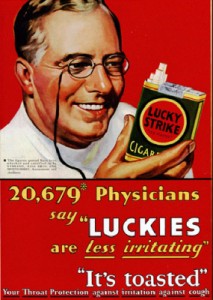For those brave souls that take Mad Men as gospel, smoking was a big part of life at one point in the United States. Everybody, or almost everybody, smoked, and the smell of smoke was just another part of life.
Well, things have changed.
Entire restaurants, rather than mere sections, are now “no-smoking,” and each legislative session shrinks the area where a person can enjoy fine tobacco products. In some cities, Davis, CA, comes to mind, smoking is even prohibited in your own home.
So, why should the workplace be any different?
In 1994, the California Legislature adopted Labor Code section 6404.5, which effectively banned smoking within enclosed work spaces.
It appears that violation of this law can now lead to liability for Serious and Willful Misconduct in the workers’ compensation arena.
Consider, if you will, the case of Blaylock v. Negherbon Auto Center. Mr. Blaylock, a gentleman suffering from asthma, was constantly required to spend long periods of time in the enclosed office of the Finance Manager, who smoked on a regular basis in her office. The record reflects that he complained frequently about his deteriorating health from having to constantly breathe in the smoke from the finance manager’s cigarettes, but even his eventual trip to the emergency room did not slow or stop her smoking in his presence (or rather, requiring his presence while she smoked).
Applicant was ultimately found totally permanently disabled, and pursued the increased benefits allowed for serious and willful misconduct.
The defense seemed focus on the fact that the employer did not know it was violating the law, and was not aware of Labor Code section 6404.5. However, the workers’ compensation Judge was not persuaded – reasoning that it is unlikely that an employer was completely unaware of the change in the law, and that the use of the term “enclosed space” by the management reflected at least some knowledge of Labor Code section 6404.5.
Now, it’s important, when considering the merits of this case, to recall that the world was a very different place when applicant had to go to the emergency room in May of 1998. Smoking was still much more common-place than today, and it is possible that the employer was aware of “a law” and incorrectly interpreted it to mean that, so long as she kept her smoke in her office and not in the general work area, she would be fine.
But, another factor in this was credibility – the WCJ found the applicant to be credible, and the finance manager to be not credible, and such a finding is typically the subject of the WCAB’s deference.
The WCJ found for the applicant, WCAB denied reconsideration, and the Court of Appeal denied review.
The country has changed, and California has changed as well. Smoking tobacco is not as socially acceptable as it once was, and there is considerable public sentiment against tobacco now-adays.
It will be interesting to see, in the coming years, if the pendulum will swing the other way to require employers to allow medicinal marijuana smoke at work while prohibiting tobacco.
In the meantime, you should probably lay off the whole “forcing employees to inhale second-hand smoke” management style (just a thought).
Have a great weekend!

